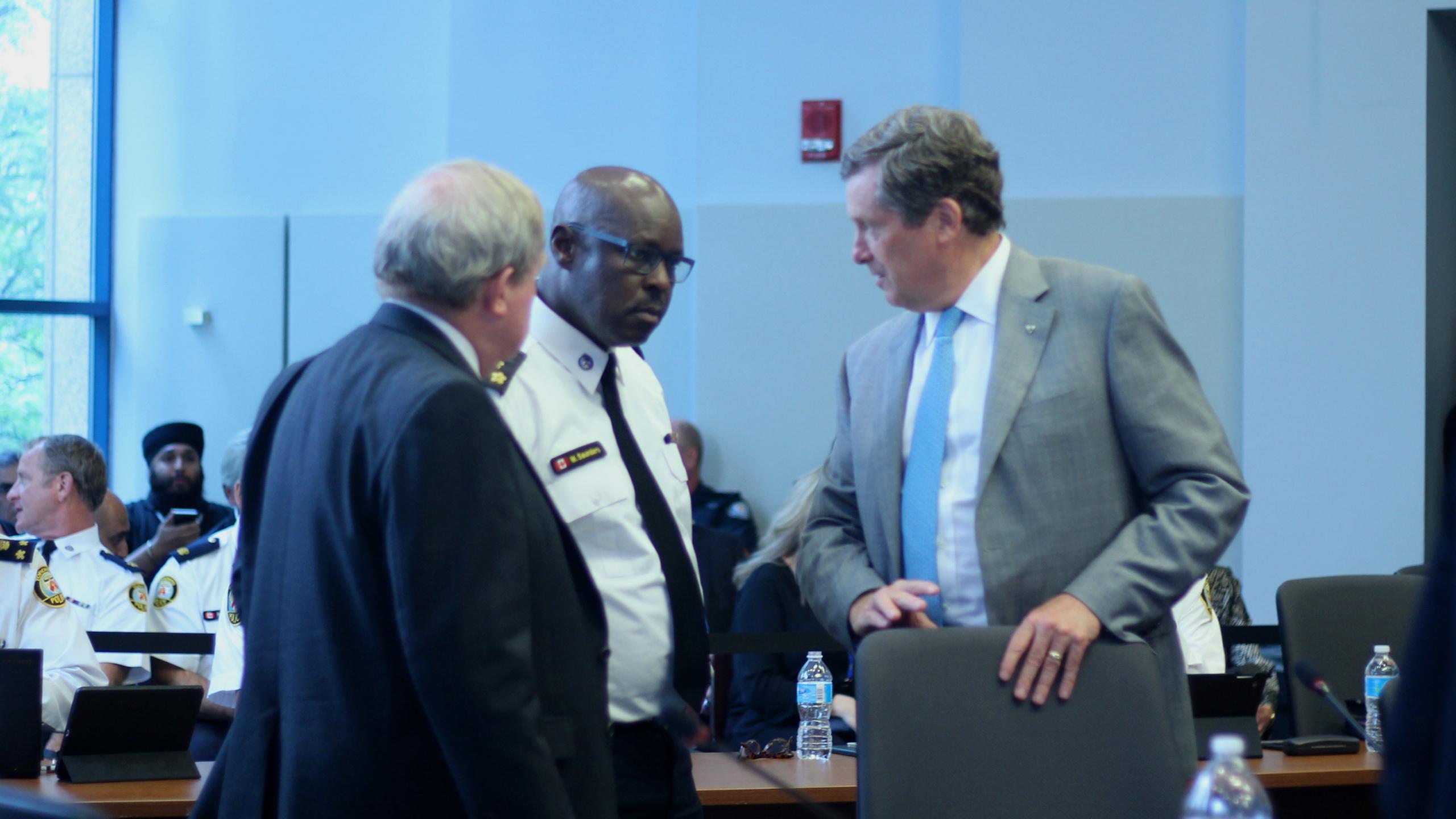By Annie Arnone
Ryerson has officially been appointed by the Toronto Police Services Board to conduct the review of the controversial Toronto School Resource Officer (SRO) program.
About 100 people gathered in a small Toronto Police Headquarters boardroom on Aug. 24, where a two-hour conversation surrounding the motion took place. Audience members began to shout “no, no, SRO” and the chair called order.
The SRO program—which requires the presence of armed officers in schools—was created in 2008 following the death of 15-year-old Jordan Manners, who was shot on school grounds. The program was implemented by Toronto police and has since been active within 75 different schools across Toronto.
The program was seen as controversial following reports of police creating an unsafe environment for students earlier this year. After two previous reviews were conducted by the Toronto Police, Mayor John Tory motioned for this to be the first independent review, with a focus on marginalized communities.
Steven Liss, Vice-President of Research and Innovation at Ryerson released the following statement regarding the review, “We will engage with Toronto Police Services to further discuss the proposal and their interest in working with Ryerson University on this project.”
The Eyeopener previously reported that the university will take part in the review to be completed in June 2018, pending board approval of $80,000 from a police “special fund,” which was granted at the Aug. 24 meeting.
According to Toronto Police chief Mark Saunders, the program exists to benefit students’ safety. He stated in a letter to the board that “the program works in partnership with students, teachers, school administrators, school boards, parents, other police officers and the community to establish and maintain a safe and healthy school community.”
However, many people disagree with Saunders’ remarks, including Desmond Cole, an activist who spoke against the motion for Ryerson to review the program, at the board meeting.
“If Ryerson wanted to show integrity, they wouldn’t participate in this study,” he said. “This study is founded on the premise that this program is good and needs to stay … the only way that Ryerson can participate in this study is if they agree to [the] police’s flawed bylaws.”
Several deputations were given speaking against the SRO program, commonly addressing the “lack of diversity” among members who sit on the board, in addition to the Ryerson review committee.
“I’m here as a concerned citizen,” said Phill Morgan, who presented the board with the first deputation regarding the SRO motion. Morgan argued that the program was implemented without “any community consultation, whatsoever”
Saunders addressed the importance of “equity” within his letter to the board, stating that “the review team uses an equity lens in all aspects of their findings and reporting, and develops an operating framework which reflects the spirit of the Toronto Police Service’s core value, Freedom from Bias.”
Morgan expressed his concern with this during his deputation, explaining that “equity has never been talked about here, it has never been addressed—what does equity look like?” he said. “And on safety, in the context of carding, safety in the context of Devonte Miller, the list is so long I don’t even know where to begin.”
Dafonte Miller Blake—a then 15-year-old boy who was surrounded by several officers with drawn guns on his walk home from school, after they “falsely identified him” as a violent suspect in 2015—was a recurring point of conversation during the meeting.
Cole questioned the lack of information provided by both Toronto Police, as well as Ryerson University about this review.
“What you guys are seeing in this room today, if you can see this whole room, is the militarization of a public place. What happens in this room is a microcosm of what happens in this school and what happens in our community,” said Cole.
Saunders explained that there are “two sides to the story” in regards to feelings surrounding the SRO program, and he “wants to hear both sides.”
“In order to be fair, this report will look at the present issues and the concerns, we are saying it hasn’t been reviewed in a manner it should be which is what we are going to be doing. It is going to be done in an open transparent form,” he said.
“These are people’s lives,” audience members shouted back at him.
Cole closed by mentioning that Toronto is a “sanctuary city” and that schools within Toronto are intended to be sanctuaries for undocumented children, not a place for police officers.
An interim report of the findings based on Ryerson’s review will be released in January 2018. There has been no comment as to whether or not the university’s findings will impact the fate of the program.













Mike
Wel’p, enjoy the increase of gang activity in your school, folks.
At least they were able to let the TPS know they know how to rhyme “no, no, SRO” angrily.
Great job guys.
On the plus side, at least I don’t have kids so I’ll never get to know how it feels to get that phone call from the school to tell me he or she was stabbed in a school stairwell.